- Home
- Alex Archer
Secret of the Slaves Page 2
Secret of the Slaves Read online
Page 2
Roux had spent the half millennium since Joan’s death trying to reassemble the saint’s shattered sword. At first he’d regarded Annja as an interloper and tried to steal the final fragment from her. Yet when she came into the presence of the other pieces, in Roux’s chateau in France, the sword had spontaneously reforged itself at her touch.
It was a bitter pill for a lifelong rationalist to swallow. Especially one who made most of her income as the resident skeptic on the notably credulous cable series Chasing History’s Monsters, on the Knowledge Channel.
Her arms and hands now moved too fast for the eye to follow. The tough, seasoned hardwood creaked and strained to the mounting fury of her blows. Human bone would give way long before that old wood did.
The sword. It had come to dominate her life.
It rested now in its accustomed location—what she thought of as the otherwhere. It was not present in this world, except at her command. To summon it, she had learned, all she needed was to form a hand as if to grasp its hilt, and exert her will. And her hand was filled.
But her life, it seemed, had correspondingly emptied since the sword came into it.
Sweat soaked her hair and flew from her face. Her wrists and knuckles and elbows sounded like machine-gun fire as they struck the muk-jong.
Orphaned at an early age, raised at an orphanage in New Orleans, Annja had always been alone. She was always apart, somehow, different, although she never tried to be. And it didn’t often bother her.
She had never felt as if she couldn’t enjoy companionship. But she didn’t actively seek it. She’d had close friends at college, on digs, among the crew of Chasing History’s Monsters. She had had lovers. But, she had to admit, no truly lasting loves.
And now she figured she never would. At least so long as she bore her illustrious predecessor’s sacred sword.
She was an archaeologist. Her period of concentration was the later Middle Ages and Renaissance Europe. She spoke all the major modern Romance languages, and Latin, and studied any number of archaic forms—and weapons.
She wasn’t sure why she was feeling a sudden gap in her life left by the lack of a lasting relationship. She had her mentor, Roux, and her sometime enemy, Garin. But she didn’t really think those relationships counted. She didn’t want them to.
Great, she thought as she slammed her forearms against the projecting limbs. She recognized the rare feeling she was experiencing.
“I’m lonely!” she said to her empty loft. She slammed an elbow smash into the upright on the last word. It broke free from its base and toppled backward.
“Nice,” she said in disgust. She rubbed her elbow, the pain corresponding to her mood. “Those things cost money.”
She stomped off to the shower.
ANNJA EMERGED from the bathroom wearing a long bathrobe swirled in patterns of green, yellow and blue. Her long hair was wrapped in a towel. She heated a cup of cocoa in the microwave and looked around her loft. While jobs were scarce for a freelance archaeologist, she had lucked into enough supplementary income from her television gig and some publishing deals to afford the space.
With Roux’s assistance she sometimes accepted commissions to do special archaeological assignments around the globe—always consistent with her strict sense of scientific ethics—for employers who wanted them kept discreet. They tended to be a lot more perilous than the usual university dig, and accordingly well compensated. Sometimes only just slightly over the considerable expense such missions tended to incur.
Flopping on her couch in the space left by several piles of manuscripts various contacts had sent her, mostly dealing with her side interest in fringe archaeology, she made the key mistake of clicking on the television.
She was hoping for a distraction. What she got was Kristie Chatham, on location with some kind of cockamamy Knowledge Channel crossover production in England. Annja was all too aware of not having been invited to take part.
“…standing here in front of Stonehenge,” Kristie was saying brightly, “which as we all know was built by the Druids…”
Annja emitted a strangled scream and threw a cushion at the screen. “No, you bimbo,” she shouted. “No, no, no. Stonehenge was built thousands of years before the Druids. Don’t you bother to research anything?” A better question might’ve been, didn’t the Knowledge Channel fact-check anything? But she knew the answer to that one, too.
“I’m here with Reggie Whitcomb of the South England Pagan Federation,” Kristie bubbled on, “who’s going to explain how the Druids levitated the huge cross-pieces, called sarsen stones, into place using their advanced psychic powers.”
Annja grabbed the remote and clicked off the set just as Kristie turned her microphone toward a chinless guy wearing a white robe with a peaked hood that made him look as if he belonged to a middle-school auxiliary of the Ku Klux Klan. The skies were black over Salisbury Plain, and the wind cracked like wet sheets whipping on a clothesline. Annja hoped Kristie would get struck by lightning. Or at least soaked to the skin.
Of course that would make Kristie’s sheer white blouse transparent. And Kristie would score another top-viewed video on You Tube. Unlike a lot of its media rivals, the Knowledge Channel never set its legal hounds to pull such videos down—the producers had noticed how ratings spiked for their repeats after one went online.
Annja slammed her remote on top of a stack of printouts on the couch beside her.
“It’s not like I’m Ms. Establishment Science or anything,” she muttered, with her chin down to her clavicle. “It’s just that I don’t open my mind so wide my brain rolls out my mouth.”
Her cell phone rang and she frowned at it in suspicion. If that’s Doug Morrell, his head’s coming right off, she thought.
She picked it up, flipped it open. “Hello.”
“Annja Creed?”
Whomever the voice belonged to, it was not her producer from Chasing History’s Monsters. The voice was like liquid amber poured over gravel—deep, rugged, yet somehow flowing.
Her eyes narrowed. I know that voice, she thought. It sounds so familiar.
“Ms. Creed?” She was certain of the Irish accent.
“Oh. Yeah. Sorry. This is Annja.”
“Ms. Creed, my name is Iain Moran. I’m a musician. You may have heard of me.”
“Sir Iain Moran?” Annja asked. It couldn’t be.
“The same.” Her mind’s eye could see that famous smile, at once roguish and world-weary.
“Publico? Lead singer for T-34?”
“The very one.”
“Right,” Annja was in no mood for pranks.
“Don’t hang up! Please. I really am Sir Iain Moran.”
“Sure. Multibillionaire rock stars call me every day. If Doug Morrell put you up to this, you’re both way overdue for a good swift kick to the—”
“Please. I’d very much like to consult you on a professional matter, concerning your expertise. Would it help to assuage your doubts if my helicopter collected you on the roof of your flat in fifteen minutes?”
It was original, as pranks go. She had to give her caller that. “You’re on,” Annja said, daring her caller to push this as far as it would go.
Fifteen minutes later she stared openmouthed into the brownish haze of a hot Brooklyn day. Her face and hair were whipped by the downblast as a Bell 429 helicopter descended to the roof.
2
A man with long dark blond hair blowing out behind his craggy face was striding toward the helicopter as its landing gear bumped down into the yellow painted circle of the skyscraper’s helipad. He wore a tan suit with a dark chocolate tie blown back over his shoulder.
Two men stood flanking the doorway the long-haired man had emerged from. Their hands were folded before them and they looked like slabs in black suits. Even from a distance Annja got the impression their musculature was the force-fed beef characteristic of U.S. ground-force soldiers, not the torturously detailed sculpting of weight-room juicers.
; The pleasant young Asian woman in a blue-gray business suit who had originally squired Annja aboard the helicopter, and smilingly evaded the questions Annja peppered her with, helped Annja into the heat of the Manhattan summer morning. The man in the pale suit neared. His face split in a smile.
“I’m Sir Iain,” he said, raising his voice to carry over the dying whine of the engine and the slowing blades. “Or Publico, if you prefer.” He took the hand Annja extended in a dry, strong grip.
“It was good of you to accept my invitation on such short notice,” he said. He put fingertips behind Annja’s shoulder and applied gentle pressure. “I’m a huge fan of your work. Your writing, as well as your television career. Please, come with me.”
She found, as he guided her toward the doorway, that she did not resent the physical contact. He was around her height, five-ten maybe five-eleven. His shoulders and chest seemed massive, which seemed unusual for a rock musician; she had them pegged as mostly on the weedy side. But his sense of presence loomed like a skyscraper and warmed like the sun.
There was no mistaking that this really was the famous Publico. There were those blue eyes, pale as the northern Irish sky beneath which he’d grown up. There was the famous craggy profile, looking more like a prizefighter’s than a rock and roller’s, thanks to the nose famously smashed by a British paratrooper’s rifle butt during a Dublin demonstration. The voice, gravelly yet the more compelling for it, was compliments of an Ulster policeman’s baton that nearly crushed his larynx.
Unlike a lot of celebrities, neither Moran nor his two longtime bandmates had any whiff of the poseur about them. They had been there and done that, protesting the English occupation of Northern Ireland, as well as the bloody sectarian violence of both Catholics and Protestants. They’d earned the admiration of the world and the hatred of zealots on all three sides, and had paid their dues in real blood and pain.
The band’s music reflected the socialist activism of its members as well as their fervent Christian convictions—decidedly less popular among their audience, which spanned the age range from preteens to baby boomers. But their sincerity won over even the most irreligious—as did their hard-rocking music.
Annja was intrigued. He seemed wholly aboveboard. Despite the unsolicited contact his manner was correct and friendly. Charisma emanated from him like heat from a forge.
“What exactly did you whisk me here for, Sir Iain?”
He offered a lopsided smile and bobbed his head once. “Fair enough question,” he said. “Permit me to answer with one. How would you like to save the world?”
“That’s not an offer an archaeologist hears very often,” she said. “But I’m afraid I can’t contribute much to any of your causes.”
“It’s not money we want,” he said. “But your courage, your skills—your soul.”
She looked at him and he grinned.
“How would you like to see an authentic cursed tome?” he asked.
She grinned back. “You do know the way to a lady’s heart, sir,” she said. “Lead on.”
“IT’S IMPRESSIVE,” she said.
With his two shadows drifting along behind—making little more noise than shadows—Moran had squired her down into the skyscraper and to a window he assured her was bulletproof polycarbonate, double paned.
It looked out, and down, on a cold room. In the middle of the sterile white floor, twelve feet below them, stood a large cylinder with what looked like a mirror-polished brass base and a similar cap. The cylinder itself was clear.
“It’s Lexan, as well,” Sir Iain said. “Treated with a special coating inside and out that resists corrosion.”
On a gleaming chrome pedestal within the cylinder rested a book. It was certainly grand enough—the approximate size and shape of an unabridged dictionary. The cover was thick and cracked from what she could see on the open book. The pages were brown. She could just make out faded, crabbed brown writing on them.
“Nitrogen environment?” she asked.
“Of course.”
She tried not to thrill at that rolling deep baritone.
She turned a raised brow to him. “I’m surprised you’re interested in rare books.”
“You think all rock ’n’ rollers are illiterate, hell-raising dopers?” He shrugged. His shoulders rolled impressively inside his immaculately tailored coat. “I’ve been clean and sober since my well-publicized overdose. I’ve had to find something to do with my time since other than read the Bible.”
IN A ROOM down a flight of stairs he gestured toward a large flat-screen monitor, hung above a modern workstation of stainless steel. Several other computers were set up at other stations. On the big screen two pages were represented many times larger than life. Here the ink looked purplish rather than brown.
“It’s the journal of an eighteenth-century Portuguese Jesuit,” Moran said, “recounting his journey up the far Amazon.”
“A lot of Jesuits made the trip in those days,” Annja said.
“Indeed. I rather suppose they did. Would you care to read it?”
“I generally prefer to read the original document when it’s available,” she said. “The camera so seldom catches everything”
She was a hands-on sort of woman where historical artifacts were concerned. It was a major reason she’d chosen to be an archaeologist as opposed to a historian. She didn’t just want to study history. She wanted to feel history. To see where it had taken place, to hold in her hands implements—or documents—that had changed the world. She wanted to breathe the same air the heroes and heroines of history—unknown and world famous—had breathed when they performed their great deeds. She wanted to be part of history.
And I am, she thought. A lot more literally than I’m comfortable with.
“Not possible, I fear,” he said.
“I understand,” she said, unable to repress a little sigh of frustration. “Obviously it’s in an extremely fragile state to require such extreme preservation measures.”
“You don’t understand, Ms. Creed,” he said. “Everyone who handles this book dies. Horribly.”
She looked aside. A wall-sized window, waist high, opened into the cold room from the reading chamber. The book itself in its high-tech bell jar looked even more impressive closer up.
“I don’t believe in curses, Sir Iain.”
His laugh was short. “There’s nothing paranormal about it,” he said, “or not overtly so. The pages and binding are imbued with a hitherto unknown living organism that is not unlike slime molds. It attacks whoever touches it, both by means of airborne spores and by contact. The effect resembles a cross between flesh-eating bacteria and sarin gas. It isn’t pretty. And it is extremely fast acting. As well as untreatable by any known means.”
“Nice.” She sucked in a sharp breath. The air was cool, smelled vaguely of ozone. “How did you get it back here?”
“Carefully. Very carefully.”
She went to the workstation and sat in the chair. Reading was dead easy. A black wireless mouse controlled a cursor on the screen. She could point to icons around the perimeter of the image. When she ran the cursor over them, text tips popped up.
“Interesting,” she said, frowning slightly in concentration at the huge high-definition screen. “Are these the pages it’s currently open to?”
“Yes,” he said, “although you can page through it. The entire volume has been digitized.”
“I see. Well, it’s open to a very dramatic passage. Our author’s talking about what seems to be the end of his journey, of both the wonders and hazards he encountered—a colossal snake—had to be an anaconda. They’re one of the world’s largest. And, whoa, a golden onza. Hmm.”
“You can read that? That easily?”
“I specialize in archaic Romance languages, Sir Iain.”
“But the handwriting—it’s all just spider tracks to my eyes. Worse than my handwriting, and that’s saying a packet.”
She smiled. “As I guess I hinted earlier,
this isn’t the first old Portuguese Jesuit diary I’ve looked at.”
“What’s a ‘golden onza’?” he asked. “It seemed to strike you as significant.”
“An onza is a jaguar. A golden onza is a particularly impressive specimen. Larger than life, you might say. Legend imbues them, some of them anyway, with incredible intelligence and sometimes outright supernatural powers.”
“Indeed.”
“Okay. Apparently our priest was captured by Indians, blindfolded and taken to something called quilombo dos sonhos,” Annja said as she continued reading.
She sat back. “Dos sonhos translates as, ‘of dreams,’” she said. “But what’s a quilombo?”
He pulled a chair over next to hers and sat, leaning slightly forward, with his elbows on his thighs. “Have you heard of the Maroons, then?”
She turned to face him. “If I recall correctly, that was a name for escaped New World slaves who fought guerrilla campaigns against recapture—sometime with pretty significant success. Toussaint-Louverture ran the French colonial overlords clean out of Haiti. Of course, I suspect they’d be called terrorists today.”
“These quilombos, I’m told, were settlements the Brazilian Maroons formed in the wilds, mostly along the coast,” he said. “Some eventually became republics powerful enough to stand off their erstwhile oppressors for centuries. A few actually maintained their independence until the Brazilian empire became the republic in 1889. Several are still around today as townships.”
He sat back and draped an arm over the back of his chair.
“The most famous of all was the Quilombo dos Palmares in northeastern Brazil. It held out against Dutch attacks, as well as Portuguese, until it was reduced by artillery in 1694.” He frowned. “Curious, really. My researchers inform me they also traded quite frequently with the Dutch and the English, for arms to use against their former masters.”
“Alliances were elastic in those days,” Annja said, drawn irresistibly back to the big screen. “As well as these days, and all other days I’ve ever read about. This quilombo the good Father describes—”

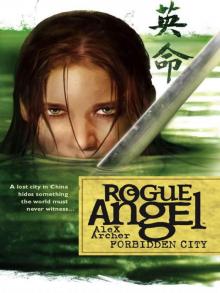 Rogue Angel: Forbidden City
Rogue Angel: Forbidden City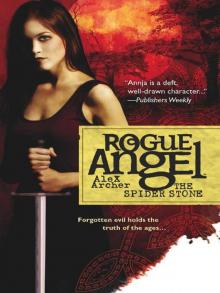 The Spider Stone
The Spider Stone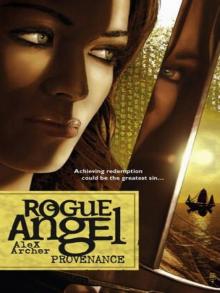 Provenance
Provenance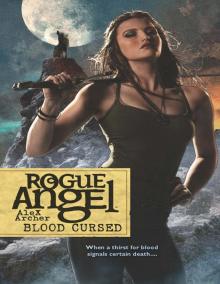 Blood Cursed
Blood Cursed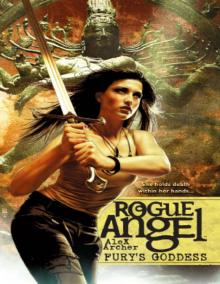 Fury's Goddess
Fury's Goddess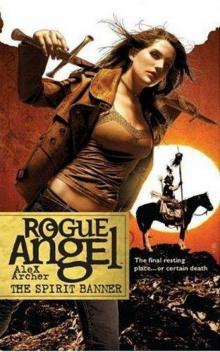 The Spirit Banner
The Spirit Banner Footprints
Footprints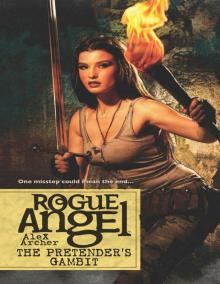 The Pretender's Gambit
The Pretender's Gambit Rogue Angel: The Lost Scrolls
Rogue Angel: The Lost Scrolls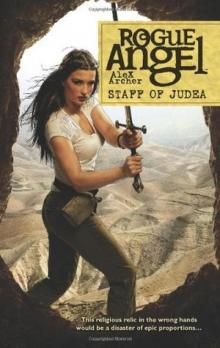 Staff of Judea
Staff of Judea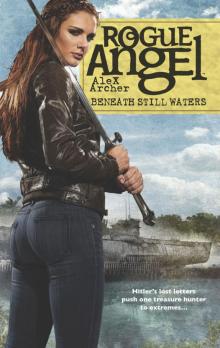 Rogue Angel 55: Beneath Still Waters
Rogue Angel 55: Beneath Still Waters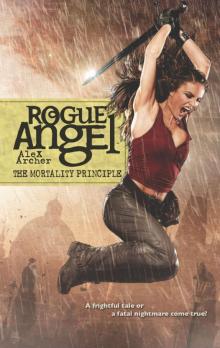 The Mortality Principle
The Mortality Principle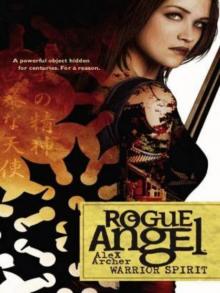 Warrior Spirit
Warrior Spirit Paradox
Paradox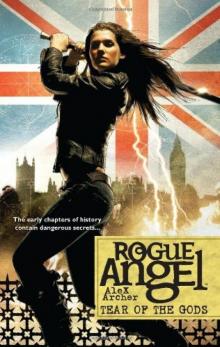 Tear of the Gods
Tear of the Gods Forbidden City
Forbidden City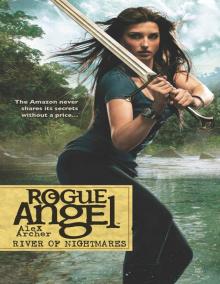 River of Nightmares (Rogue Angel)
River of Nightmares (Rogue Angel)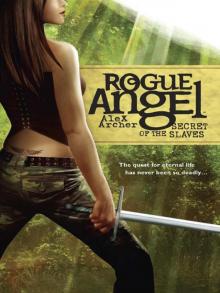 Rogue Angel: The Secret of the Slaves
Rogue Angel: The Secret of the Slaves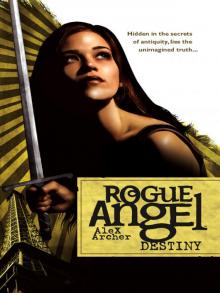 Destiny
Destiny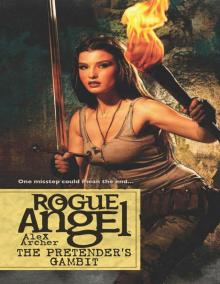 Rogue Angel 51: The Pretender's Gambit
Rogue Angel 51: The Pretender's Gambit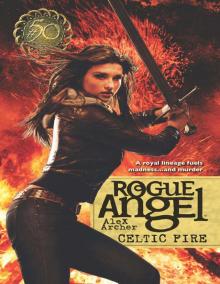 Celtic Fire
Celtic Fire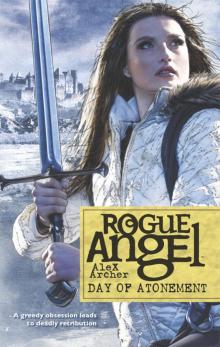 Rogue Angel 54: Day of Atonement
Rogue Angel 54: Day of Atonement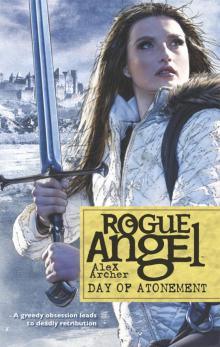 Day of Atonement
Day of Atonement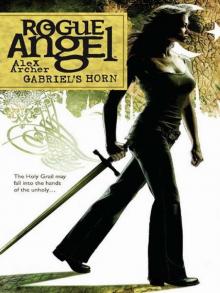 Rogue Angel: Gabriel's Horn
Rogue Angel: Gabriel's Horn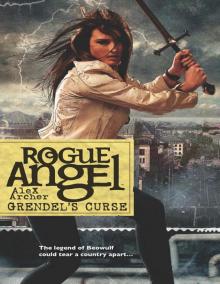 Grendel's Curse
Grendel's Curse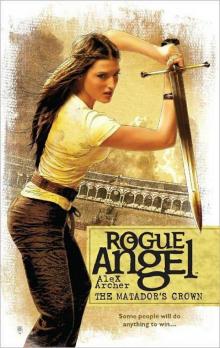 The Matador's Crown
The Matador's Crown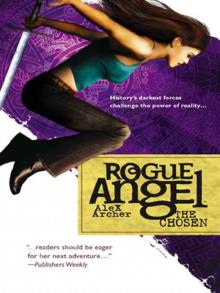 Rogue Angel: The Chosen
Rogue Angel: The Chosen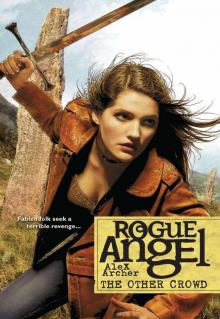 The Other Crowd
The Other Crowd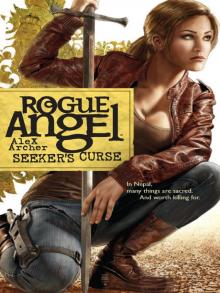 Seeker’s Curse
Seeker’s Curse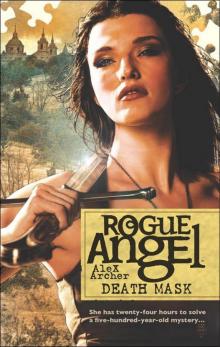 Rogue Angel 52: Death Mask
Rogue Angel 52: Death Mask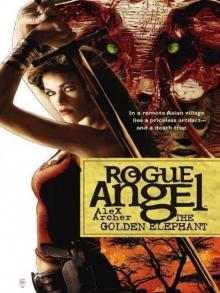 The Golden Elephant
The Golden Elephant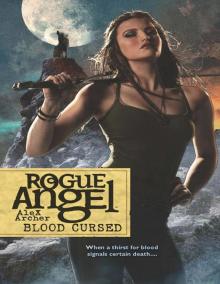 Blood Cursed (Rogue Angel)
Blood Cursed (Rogue Angel)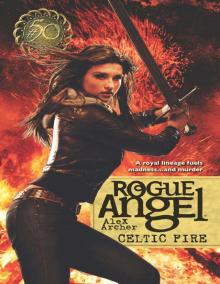 Celtic Fire (Rogue Angel)
Celtic Fire (Rogue Angel)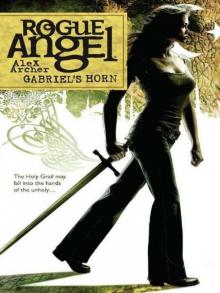 Gabriel's Horn
Gabriel's Horn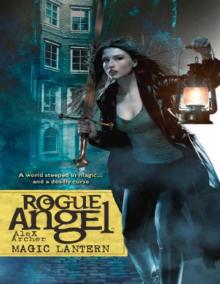 Magic Lantern (Rogue Angel)
Magic Lantern (Rogue Angel)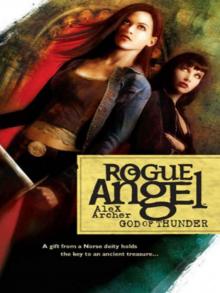 God of Thunder
God of Thunder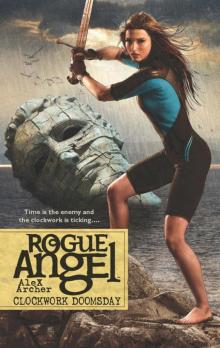 Clockwork Doomsday
Clockwork Doomsday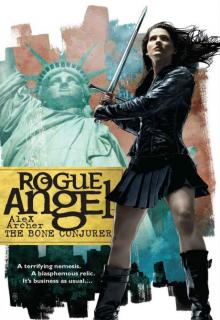 The Bone Conjurer
The Bone Conjurer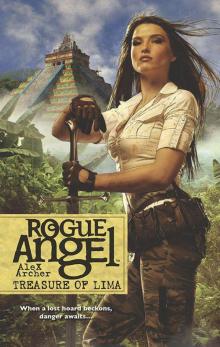 Treasure of Lima
Treasure of Lima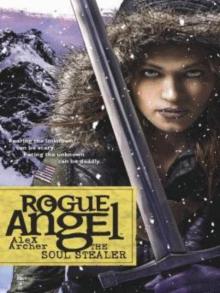 The Soul Stealer
The Soul Stealer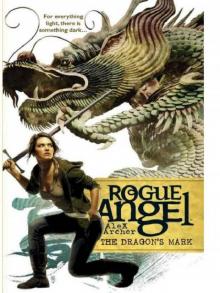 The Dragon’s Mark
The Dragon’s Mark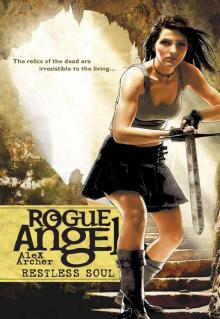 Restless Soul
Restless Soul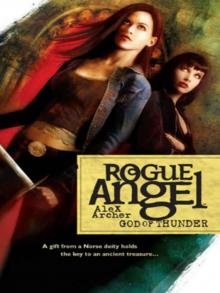 Rogue Angel: God Of Thunder
Rogue Angel: God Of Thunder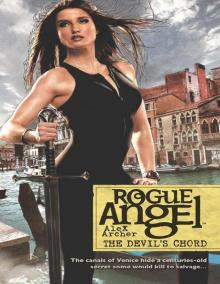 Rogue Angel 49: The Devil's Chord
Rogue Angel 49: The Devil's Chord Death Mask
Death Mask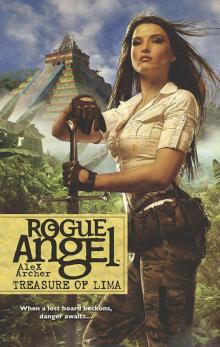 Rogue Angel 46: Treasure of Lima
Rogue Angel 46: Treasure of Lima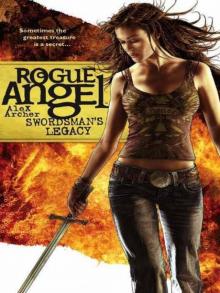 Swordsman's Legacy
Swordsman's Legacy The Oracle's Message
The Oracle's Message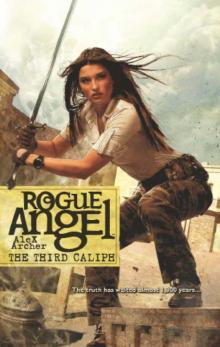 The Third Caliph
The Third Caliph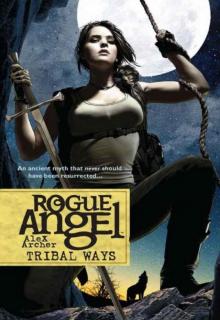 Tribal Ways
Tribal Ways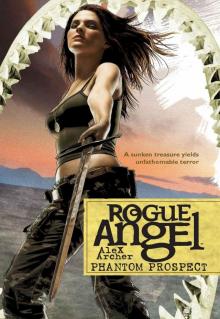 Phantom Prospect
Phantom Prospect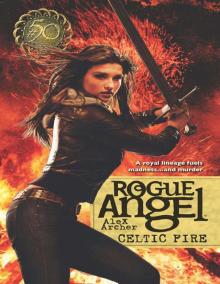 Rogue Angel 50: Celtic Fire
Rogue Angel 50: Celtic Fire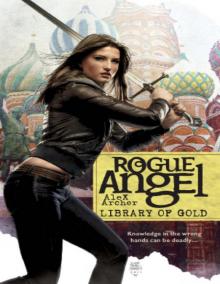 Library of Gold
Library of Gold Rogue Angel 53: Bathed in Blood
Rogue Angel 53: Bathed in Blood Sacred Ground
Sacred Ground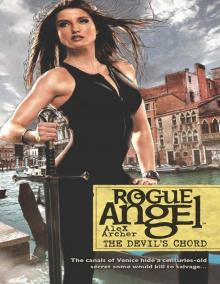 The Devil's Chord
The Devil's Chord Serpent's Kiss
Serpent's Kiss The Vanishing Tribe
The Vanishing Tribe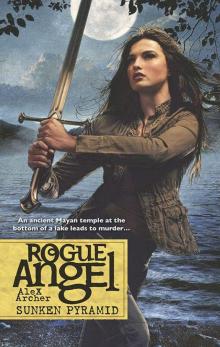 Sunken Pyramid
Sunken Pyramid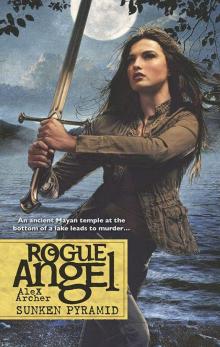 Sunken Pyramid (Rogue Angel)
Sunken Pyramid (Rogue Angel)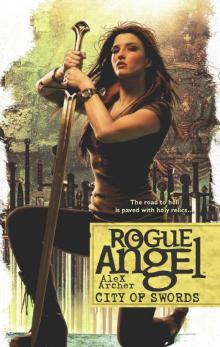 City of Swords
City of Swords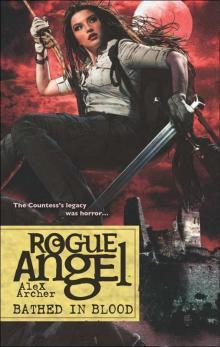 Bathed in Blood
Bathed in Blood The Lost Scrolls
The Lost Scrolls The Babel Codex
The Babel Codex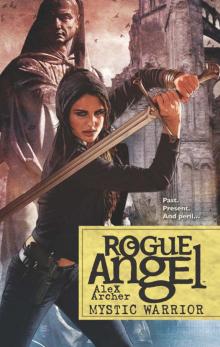 Mystic Warrior
Mystic Warrior Eternal Journey
Eternal Journey Beneath Still Waters
Beneath Still Waters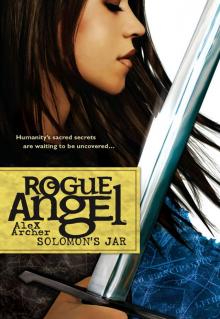 Solomon's Jar
Solomon's Jar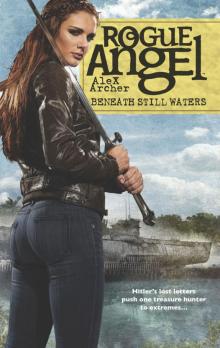 Beneath Still Waters (Rogue Angel Book 55)
Beneath Still Waters (Rogue Angel Book 55) Cradle of Solitude
Cradle of Solitude Secret of the Slaves
Secret of the Slaves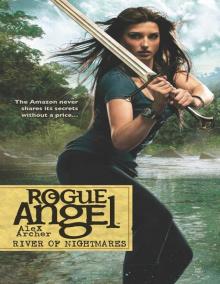 River of Nightmares
River of Nightmares Polar Quest
Polar Quest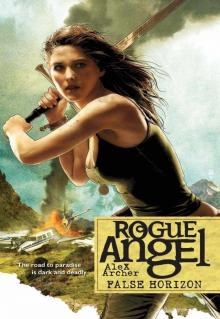 False Horizon
False Horizon